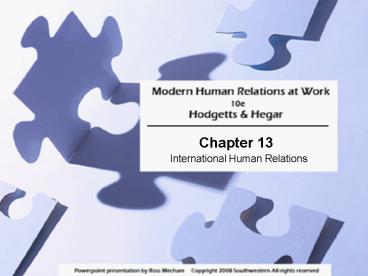International Human Relations - PowerPoint PPT Presentation
1 / 16
Title:
International Human Relations
Description:
Collectivism is the tendency of people to belong to groups that look after each ... Collectivism. Masculinity. Femininity. Cultural assimilator. Workforce ... – PowerPoint PPT presentation
Number of Views:120
Avg rating:3.0/5.0
Title: International Human Relations
1
Chapter 13
- International Human Relations
2
Learning Objectives
- Discuss the four major reasons why businesses
become multinational companies. - Identify the term culture and relate four basic
dimensions of international culture. - Discuss the value of cultural dimensions in
understanding the impact of culture in the global
arena.
3
Learning Objectives (contd.)
- Relate the ways in which culture affects work
attitudes, motivation, and how people deal with
time. - Discuss outsourcing in globalization.
- Describe several major global human resource
challenges. - Explain ways of developing a global perspective.
- Discuss how an organized office can enhance your
career.
4
Multinational Company
- is a company headquartered in one country but
having operations in two or more countries.
5
Table 13.1 - The Most Admired Companiesfor 2006
6
Table 13.2 - Worlds Largest MNE Corporations
7
Culture
Culture is the acquired knowledge that people use
to interpret experience and to generate social
behavior.
8
Ethnocentrism
- is the belief that ones way of doing things is
superior to that of others.
9
Table 13.3 - Comparison of Cultural Values by
Priority
10
Hofstedes Cultural Dimensions
- Power distance is the degree to which less
powerful members of the society accept the fact
that power is not distributed equally. - Uncertainty avoidance is the extent to which
people feel threatened by ambiguous situations
and have created institutions for minimizing or
avoiding these uncertainties.
11
Hofstedes Cultural Dimensions (contd.)
- Individualism is the tendency of people to look
after themselves and their immediate family only. - Collectivism is the tendency of people to belong
to groups that look after each other in exchange
for loyalty.
12
Hofstedes Cultural Dimensions (contd.)
- Masculinity is the degree to which the dominant
values of a society are success, money, and
material things. - Femininity is the degree to which the dominant
values of a society focus on caring for others
and on the quality of life.
13
The Impact of International Culture at Work
- Work Attitudes
- Achievement Motivation
- Time and the Future
14
Selection Criteria to Fill Overseas Positions
- The ability to adapt personally to an overseas
assignment - Technical competence
- The ability of ones family to adapt
- Human relations skills
- Previous overseas experience
15
Cultural Assimilator
A cultural assimilator is a programmed learning
technique that is designed to expose members of
one culture to the values of another culture.
16
Key Terms in the Chapter
- Culture
- Ethnocentrism
- Power distance
- Uncertainty avoidance
- Individualism
- Collectivism
- Masculinity
- Femininity
- Cultural assimilator
- Workforce optimization
- Culture shock
- Honeymoon stage
- Cultural shock stage
- Negotiation stage
- Acceptance stage
- Outsourcing
- World Citizens Guide for Americans































